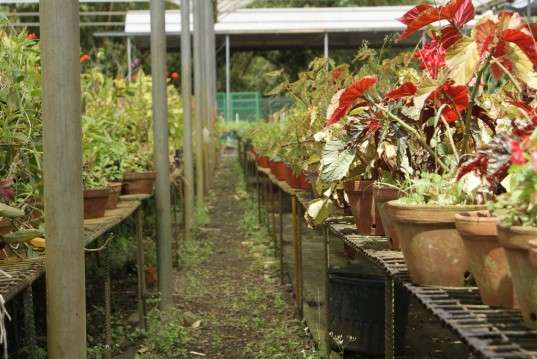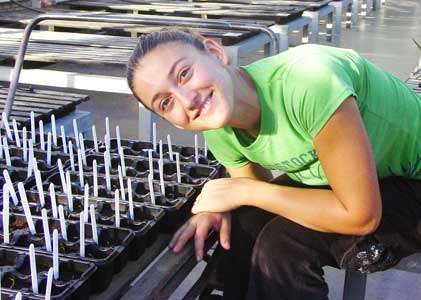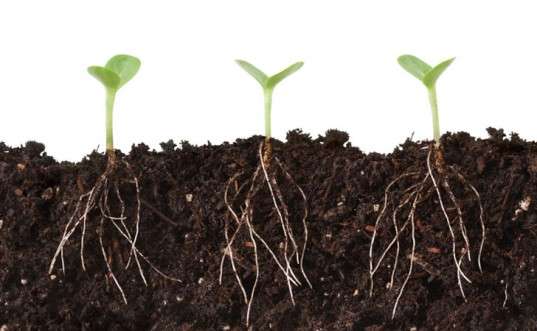It looks like you're using an Ad Blocker.
Please white-list or disable AboveTopSecret.com in your ad-blocking tool.
Thank you.
Some features of ATS will be disabled while you continue to use an ad-blocker.
share:
Yes, plants may be able to respond to sounds and even make clicking noises to communicate with each other, according to new research.
If initial results can be confirmed and replicated, the latest findings could change our understanding of how plants sense their environment and communicate with each other. It would also overturn years of scepticism that plants can 'talk' in this way and give lie to the idea that animals are the only organisms capable of such feats..



Read the whole article here
Original source
If initial results can be confirmed and replicated, the latest findings could change our understanding of how plants sense their environment and communicate with each other. It would also overturn years of scepticism that plants can 'talk' in this way and give lie to the idea that animals are the only organisms capable of such feats..

Watch what you say around your houseplants — they can probably hear you, and they might even be talking about you. The idea that plants communicate with each other is normally based in science-fiction or fantasy, but new research out of The University of Western Australia reveals that this actually may be the case.
UWA Postdoctoral Research Fellow Dr. Monica Gagliano has discovered that our green friends not only react to sounds, but they can also communicate with each other via “clicking noises.”

The team’s research, published in the leading international journal Trends in Plant Science, concludes that the discovery of plant communication needs serious investigation as it “leaves serious gaps (in) our current understanding of the sensory and communicatory complexity of these organisms.” Gagliano also added that ”it is very likely that some form of sensitivity to sound and vibrations also plays an important role in the life of plants.”
So if you notice your houseplants leaning towards you, it could be because they enjoy the sound of your dulcet tones.

Read the whole article here
Original source
edit on 15-6-2012 by elevenaugust because: (no reason
given)
edit on 15-6-2012 by elevenaugust because: To change headline "can" by "may
reply to post by elevenaugust
I was watching a documentary the other day where they showed how some plants could communicate via the release of gaseous chemicals which travel through the air and warn neighboring plants that danger is nearby. They may have more than just one communication method imo...
I was watching a documentary the other day where they showed how some plants could communicate via the release of gaseous chemicals which travel through the air and warn neighboring plants that danger is nearby. They may have more than just one communication method imo...
edit on
15/6/2012 by ChaoticOrder because: (no reason given)
Plants Can ‘Talk’ To Each Other by Clicking Their Roots
As usual with this kind of stuff, the headline is a complete sensationalist fabrication.
There is NO evidence that they can communicate by clicking their roots.
If readers take the time to read the article, they only go so far as to say it
may be the case.
May..
Not "can".
Not proof.
In fact, not even any results that need to be replicated.
Not a single one.
The article cites the journal article, Towards understanding plant bioacoustics.
If one takes the time to read the actual journal article, you will see that the experimenters set up some tests that show plants MAY under some circumstances be able to communicate, but..
THEY DONT KNOW HOW
Together, these findings beg the question: which other determinants may be operating to facilitate recognition? We do not know yet what mechanism(s) may be mediating such responses.
We believe that the hypothesis that magnetic fields may be used to convey information at close-range is a testable option worth exploring. Additionally, sound may be another modality by which plants exchange information.
They have no evidence or measurements that say any such thing.
They merely put it forward as an untested hypothesis.
Stupid lying headlines.
Dont fall for it.
edit on 15-6-2012 by alfa1 because: (no reason given)
The study found plants from the same species of beach-dwelling wildflower grew aggressively alongside unrelated neighbors but were less competitive when they shared soil with their siblings.
Sea rocket, a North American species, showed more vigorous root growth when planted in pots with strangers than when raised with relatives from the same maternal family, the study found.
This is an example of kin selection, a behavior common in animals in which closely related individuals take a group approach to succeeding in their environment, the researchers said.
Less Competition
Kin selection also applies to competition, the scientists added, because if family members compete less with each other, the group will do better overall.
"Everywhere you look, plants are growing right up next to other plants," Dudley said.
Usually it's a case of each plant for itself, she said.
news.nationalgeographic.com...
Plants Can Recognize, Communicate With Relatives, Studies Find
Old news, but I thought it was worth sharing.
Thabks for the article. I love things along these lines.
There has been alot more research than this over the years, its just not popular.
Imagine vegans that cant eat anything once they realize plants are aware and awake.
I have had it in good understanding that plants do, can, and will communicate given the chance, I just have not found a way to prove it, hope someone like this does.
I see researching these fields as a way to rejoin our nature back to life.
Cheers!
There has been alot more research than this over the years, its just not popular.
Imagine vegans that cant eat anything once they realize plants are aware and awake.
I have had it in good understanding that plants do, can, and will communicate given the chance, I just have not found a way to prove it, hope someone like this does.
I see researching these fields as a way to rejoin our nature back to life.
Cheers!
reply to post by alfa1
Many thanks for the correction, you're absolutely right, and I corrected my headline
I don't really like sensationalism stuff too, but I just thought it could be an interesting research line to follow.
Many thanks for the correction, you're absolutely right, and I corrected my headline
I don't really like sensationalism stuff too, but I just thought it could be an interesting research line to follow.
Clicking noises.
But in all seriousness I get quite teary as it is if my seedlings fail to thrive. Now I'll probably end up bawling my eyes out.
But in all seriousness I get quite teary as it is if my seedlings fail to thrive. Now I'll probably end up bawling my eyes out.
Originally posted by elevenaugust
... but I just thought it could be an interesting research line to follow.
Oh for sure it would be an interesting line of research to do.
Its just dissapointing that the article writers at "inhabitat.com" completely ignored the science that was actually performed and made the whole entire article about complete speculation that was just made up.
Not surprising though, because the article they themselves read at the WA Uni was already halfway towards that garbage.
Because, of course, the actual researched performed was obviously too boring.
reply to post by elevenaugust
If you think about it plants have been around since the Silurian Period over 445 million years ago. If plants have been constantly evolving and adapting for 445 million years, then they must have developed a level of intelligence?
We think that just because they can't move, or talk like we do than they are unintelligent. But a species that has existed for far longer than anyother on Earth, what if they have developed their own sense of communication that we do not understand?
If you think about it plants have been around since the Silurian Period over 445 million years ago. If plants have been constantly evolving and adapting for 445 million years, then they must have developed a level of intelligence?
We think that just because they can't move, or talk like we do than they are unintelligent. But a species that has existed for far longer than anyother on Earth, what if they have developed their own sense of communication that we do not understand?
edit on 15-6-2012 by CrimsonKapital because: (no reason given)
reply to post by elevenaugust
Vegans eat ya heart out.
I've felt it my whole life. Plants are as alive as animals and all can and should be eaten with respect because we are taking life to give life regardless. It bothers me that people need to make themselves feel better about eating by eating plants with the thought that it is better than killing an animal. This article and study is merely more proof.
Eat only vegetables because your body absolutely requires it.
Eat only vegetables if your religion stipulates it.
Do not eat only vegetables because you think it is better than killing animals. You're killing plants. Root veggies and herbs all get ripped and killed for the sake of our food. What? Because a plant can't bleed and cry and moan. Plants show you when they need water and will die if you don't. Some need shelter from the sun, shelter from the cold, will die from frost and will drown in a flood.
Eat your vegetable diet but don't kid yourself. You're not doing this planet or nature any better.
Vegans eat ya heart out.
I've felt it my whole life. Plants are as alive as animals and all can and should be eaten with respect because we are taking life to give life regardless. It bothers me that people need to make themselves feel better about eating by eating plants with the thought that it is better than killing an animal. This article and study is merely more proof.
Eat only vegetables because your body absolutely requires it.
Eat only vegetables if your religion stipulates it.
Do not eat only vegetables because you think it is better than killing animals. You're killing plants. Root veggies and herbs all get ripped and killed for the sake of our food. What? Because a plant can't bleed and cry and moan. Plants show you when they need water and will die if you don't. Some need shelter from the sun, shelter from the cold, will die from frost and will drown in a flood.
Eat your vegetable diet but don't kid yourself. You're not doing this planet or nature any better.
edit on 15-6-2012 by LightAssassin because: (no reason given)
reply to post by LightAssassin
I've dug potatoes and I have butchered cows and I can say there is a difference even though some Vegans are indeed self absorbed and conceited we could perhaps feed ourselves more efficiently and more in congruence with nature by eating less meat.
I've dug potatoes and I have butchered cows and I can say there is a difference even though some Vegans are indeed self absorbed and conceited we could perhaps feed ourselves more efficiently and more in congruence with nature by eating less meat.
Responding to vibrations in the soil, yes, but "clicking" their roots?
Thanks alfa.
Thanks alfa.
Originally posted by Treespeaker
Thabks for the article. I love things along these lines.
.
Imagine vegans that cant eat anything once they realize plants are aware and awake.
LOL, exactly what I was thinking. I guess the vegans will have to become breathataians. Whoops, there are microscopic organisms even in the air we breathe that we take in, and our immune system usually destroys. What a total dilemma.
Originally posted by CrimsonKapital
reply to post by elevenaugust
If you think about it plants have been around since the Silurian Period over 445 million years ago. If plants have been constantly evolving and adapting for 445 million years, then they must have developed a level of intelligence?
We think that just because they can't move, or talk like we do than they are unintelligent. But a species that has existed for far longer than anyother on Earth, what if they have developed their own sense of communication that we do not understand?
edit on 15-6-2012 by CrimsonKapital because: (no reason given)
So if plants are indeed sentient beings...is eating them morally wrong? My own anecdote here, I have a 6 year old golden pothos that I can sense when it needs to be fertilized or watered. That's how I have managed to keep it alive for so long, because I have destroyed countless plants before this one with my brown thumb. Maybe some plants also communicate with us and we maybe don't even realize it?
So if plants are indeed sentient beings...is eating them morally wrong?
Morally wrong? I guess you are eating meat everyday, aren't you?
although amazing this isn't really surprising. plants are incredible and i have learned recently that they (as well as animals, us, etc.) are in
tune with a single reality- they can read our minds which we can tell through their reactions. if you ever get the chance to see The Secret Life Of
Plants you will be blown away, i guarantee. using electrodes to hear, a woman literally (LITERALLY) teaches a cactus how to pronounce a letter by
talking. later in the film a guy hooks up electrodes to a mimosa pudica, puts his telescope on a star in Ursa Major, I think, and well.........
you also get to see Stevie Wonder (who did the soundtrack) with his sunglasses off. think Koyannisqasti but of plants and thats 50% of the movie.
you also get to see Stevie Wonder (who did the soundtrack) with his sunglasses off. think Koyannisqasti but of plants and thats 50% of the movie.
Originally posted by ChaoticOrder
reply to post by elevenaugust
I was watching a documentary the other day where they showed how some plants could communicate via the release of gaseous chemicals which travel through the air and warn neighboring plants that danger is nearby. They may have more than just one communication method imo...edit on 15/6/2012 by ChaoticOrder because: (no reason given)
What is the purpose of warning other plants danger is nearby? Are they going to pack up their roots and run away from the danger?
This is definitely something that needs more research before anyone comes to any conclusions.
I don't need a scientist to tell me plants can talk. I know they can. I could hear them as a child, specifically trees. I am serious..they make a
very low noise deep within. Trees have different voices. One of the best ways to hear it is to go shoeless, climb up a tree in a quiet, still place
and sit in its loving arms. Press your whole body and ear to the trunk and give it some time. Eventually you will hear its voice if you wait patiently
enough.
Animals and plants talk to each other. It's just that stupid humans think that because they aren't making English language sounds it isn't
communication. It's us humans who can't understand their language. It's all about language anyways. IF a human being was put in a cave with no
current languages said to that human being and then at the age of 18 was brought out and heard us all talking, it would sound weird. After all, we
only make sounds anyways. It's just that we associate sounds we make with objects....duhhhhhhhhhhhhhh
new topics
-
Mass Extinctions May Hold the Key to Life in the Universe
Education and Media: 2 hours ago -
Can we be certain that Jesus Christ was born on December 25th?
Religion, Faith, And Theology: 4 hours ago -
RIP Merrily Harpur British Big Cat Realist
Cryptozoology: 6 hours ago
top topics
-
Panamanian President-“every square meter” of the Panama Canal belongs to Panama.
New World Order: 13 hours ago, 12 flags -
Australian mercenary caught and crying as he is a prisoner of war.
Other Current Events: 12 hours ago, 10 flags -
NYPD arrests migrant who allegedly set woman on fire on subway train, watched her burn to death
Breaking Alternative News: 16 hours ago, 9 flags -
JILL BIDEN Wants JOE to Punish Democrats Who Forced Him to Leave Office in Disgrace on 1.20.2025.
2024 Elections: 13 hours ago, 9 flags -
RIP Merrily Harpur British Big Cat Realist
Cryptozoology: 6 hours ago, 6 flags -
Mass Extinctions May Hold the Key to Life in the Universe
Education and Media: 2 hours ago, 3 flags -
Can we be certain that Jesus Christ was born on December 25th?
Religion, Faith, And Theology: 4 hours ago, 1 flags
active topics
-
The Daily Mail trying to imply “it’s aliens”
Dissecting Disinformation • 16 • : andy06shake -
Can we be certain that Jesus Christ was born on December 25th?
Religion, Faith, And Theology • 20 • : visitedbythem -
Panamanian President-“every square meter” of the Panama Canal belongs to Panama.
New World Order • 20 • : fringeofthefringe -
-@TH3WH17ERABB17- -Q- ---TIME TO SHOW THE WORLD--- -Part- --44--
Dissecting Disinformation • 3790 • : Thoughtful3 -
NYPD arrests migrant who allegedly set woman on fire on subway train, watched her burn to death
Breaking Alternative News • 25 • : Flyingclaydisk -
F-18 shot down over Red Sea....by our own Destroyer?
Other Current Events • 13 • : Cosmo14 -
Mass Extinctions May Hold the Key to Life in the Universe
Education and Media • 1 • : BeyondKnowledge3 -
Australian mercenary caught and crying as he is a prisoner of war.
Other Current Events • 32 • : BedevereTheWise -
‘Something horrible’: Somerset pit reveals bronze age cannibalism
Ancient & Lost Civilizations • 19 • : Scratchpost -
RIP Merrily Harpur British Big Cat Realist
Cryptozoology • 2 • : angelchemuel
